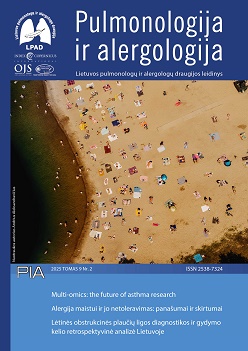EVALUATION OF THE EFFICACY OF PEMBROLIZUMAB TREATMENT IN NON-SMALL CELL LUNG CANCER. A SINGLE-CENTRE EXPERIENCE
Abstract
Lung cancer remains the leading cause of cancer-related death worldwide. In advanced non-small cell lung cancer (NSCLC), programmed death-ligand 1 (PD-L1) expression serves as a key predictive biomarker, determining the use of immune checkpoint inhibitors like pembrolizumab. Clinical trials have shown that pembrolizumab monotherapy improves survival in patients with high PD-L1 expression (≥ 50%), while adding pembrolizumab to platinum-based chemotherapy enhances outcomes across subgroups with lower PD-L1 expression (< 50%). In Lithuania, pembrolizumab has been approved as a first-line treatment for advanced NSCLC since 2018, but real-world data on its effectiveness remain limited. Aim of the study. To evaluate and compare the treatment effectiveness of pembrolizumab monotherapy and pembrolizumab combined with chemotherapy in patients with NSCLC treated at the Hospital of the Lithuanian University of Health Sciences Kauno klinikos. Methods. A retrospective analysis of medical records was conducted for patients treated at Kauno klinikos between 2020 and 2023 who received either pembrolizumab monotherapy or combination therapy with chemotherapy for advanced NSCLC. Results. Patients receiving pembrolizumab monotherapy were older (median age 70 [range 37–84]) than those receiving combination therapy (median age 64 [range 37–82]) (p = 0.019). The treatment groups had no statistically significant differences in progression-free survival (PFS) or overall survival (OS). Survival outcomes did not vary significantly according to tumor histological type. In the subgroup with PD-L1 expression ≥ 50%, median PFS was 233 days (95% CI: 176–272; p = 0.647), and median OS was 590 days (95% CI: 262–918; p = 0.020). Male sex (p < 0.001) and lymph nodemetastases (p < 0.001) were associated with poorer overall survival. Regarding treatment safety, adverse events related to chemotherapy were significantly more frequent in the combination therapy group. Conclusions. Treatment effectiveness was comparable between pembrolizumab monotherapy and combination therapy, regardless of tumor histological type. Higher overall survival was observed in patients with high PD-L1 expression. Patient sex and disease spread significantly influenced treatment outcomes. Chemotherapy-related adverse events were more frequent among patients receiving combination therapy.


